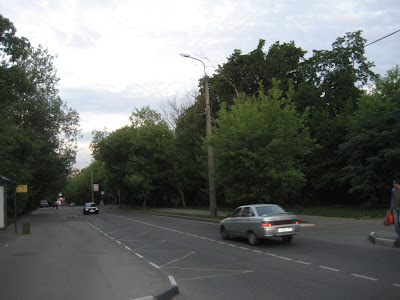 Since I’m still a cautious shopper here, I watched as one cagey old babushka dug around among the boxes and took from the one she did when she was done. They were very good. A few weeks later, we were treated when the first vishnya from Russia arrived. These are completely different creatures, though they look just like familiar black cherries. They are more tart, and taste rather like berries. This is a photo, by the way, of Olga’s hand snatching away yet another cherry as we enjoyed a pre-dinner snack. You have to be very quick if you want any when Olga is around.
Since I’m still a cautious shopper here, I watched as one cagey old babushka dug around among the boxes and took from the one she did when she was done. They were very good. A few weeks later, we were treated when the first vishnya from Russia arrived. These are completely different creatures, though they look just like familiar black cherries. They are more tart, and taste rather like berries. This is a photo, by the way, of Olga’s hand snatching away yet another cherry as we enjoyed a pre-dinner snack. You have to be very quick if you want any when Olga is around.In America we are quite alienated from our food supplies because we have air-shipped fruits from all corners of the earth arriving freshly waxed at Stop n’ Shop everyday. You start to loose track with the seasons when this happens. But you really see it here. I remember during our last visit here in summer 2005 when the watermelons all arrived, as if at once. For a few days, every road crossing had a giant bin of arbus for sale.












